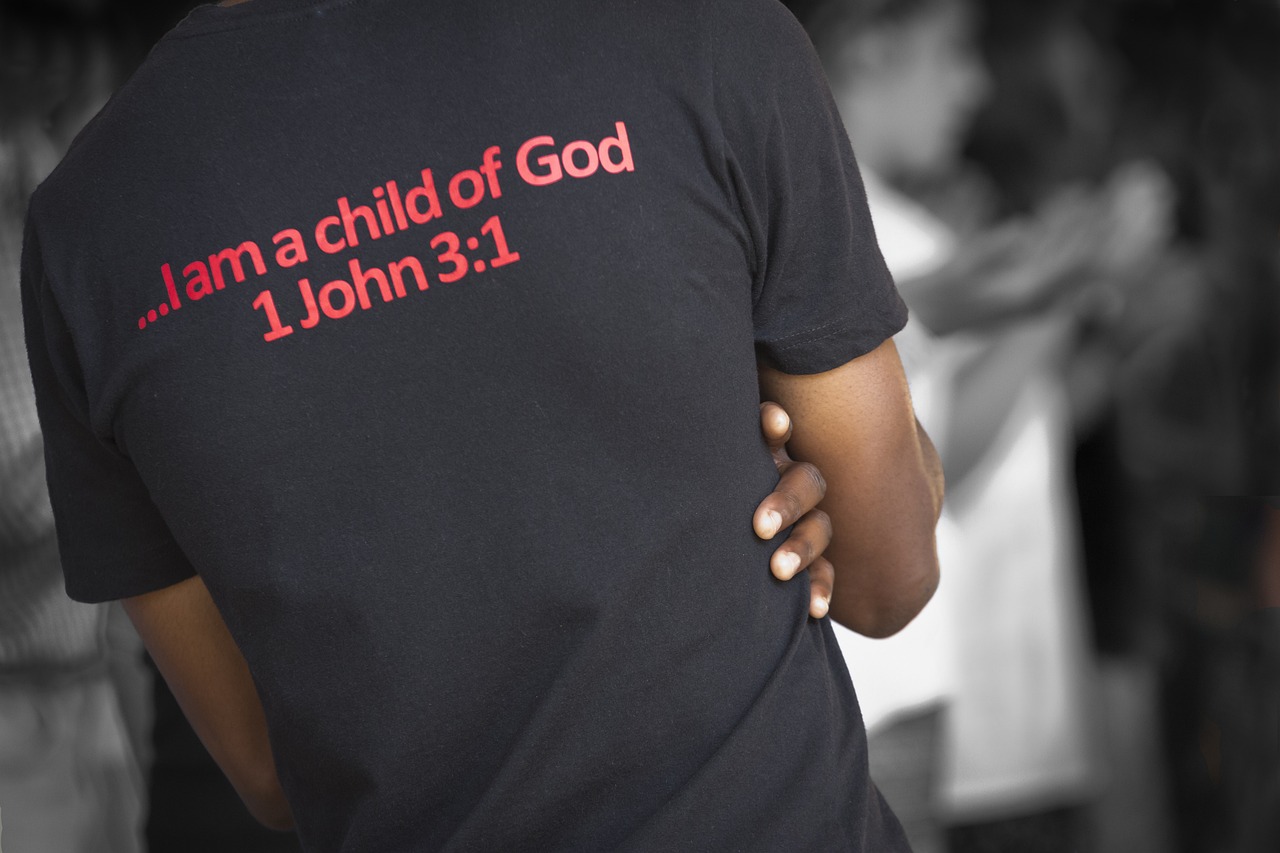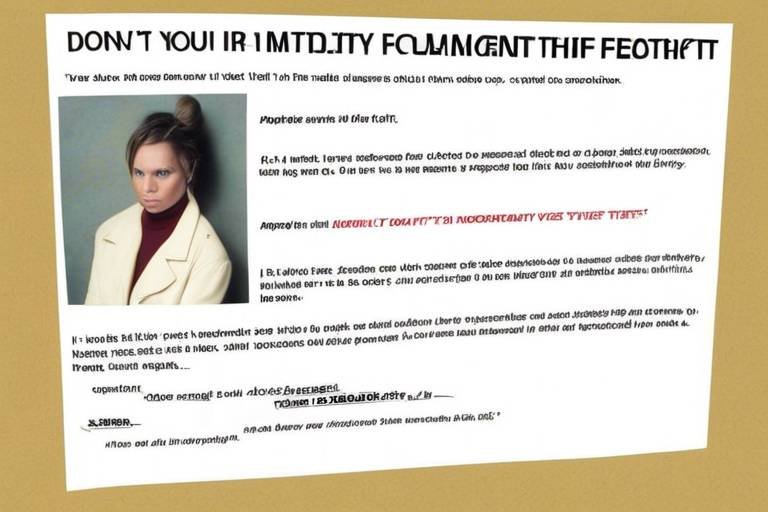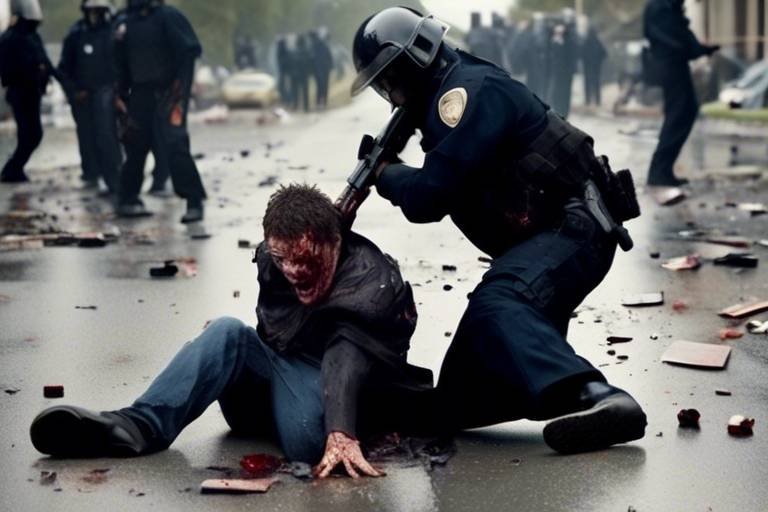Why is Murder Morally Wrong?
Murder is often viewed as one of the most heinous acts a person can commit, and for good reason. It raises profound questions about the nature of morality, the sanctity of life, and the consequences of our actions. But why is murder considered morally wrong across nearly all cultures and societies? To answer this, we must dive deep into the ethical frameworks that shape our understanding of right and wrong. At its core, the moral prohibition against taking a life is not just a societal norm; it is a complex interplay of philosophical theories, psychological factors, and legal implications that together reinforce the gravity of this act.
When we consider the nature of morality, we find that it is not a one-size-fits-all concept. Different cultures might have varying standards, yet the fundamental belief in the wrongness of murder seems to be a universal thread. This is largely due to the intrinsic value placed on human life, which is a cornerstone of moral philosophy. In essence, murder disrupts the social fabric, causing emotional and psychological harm not just to the victim, but to families, communities, and society at large. The act of taking a life creates a ripple effect, leading to suffering that extends far beyond the immediate act itself.
Moreover, the consequences of murder are far-reaching. It can lead to a breakdown of trust within communities, foster fear, and create an environment of instability. When a murder occurs, it doesn't just affect the victim; it affects everyone connected to them. Families are shattered, friendships are strained, and entire communities can be left reeling from the shock. This collective trauma reinforces the moral condemnation of murder, as societies strive to protect their members from such devastating acts.
In exploring why murder is morally wrong, we also have to consider the psychological aspects. Empathy plays a crucial role in our moral judgment. The ability to put ourselves in someone else's shoes allows us to appreciate the profound loss that comes with murder. Imagine losing a loved one to such a senseless act; the emotional turmoil that follows is unimaginable. This empathetic understanding is what drives many to view murder as not just a legal issue, but a profound moral failing.
As we delve deeper into this topic, we must also acknowledge the role of social conditioning. From a young age, we are taught the values and norms of our society, which include the sanctity of life. These lessons shape our perceptions and influence our moral compass. When we witness or hear about murder, our conditioned responses kick in, prompting feelings of outrage and sadness. This social conditioning reinforces the idea that murder is not just wrong in a legal sense, but fundamentally immoral.
In conclusion, the moral wrongness of murder is multifaceted, involving ethical theories, psychological factors, and societal norms. It is a topic that elicits strong emotions and deep reflections on what it means to live in a community where life is valued. As we continue to explore the implications of murder, we find that the reasons behind its moral condemnation are as complex as they are compelling.
- What is the main ethical reason that murder is considered wrong?
The main ethical reason is the intrinsic value placed on human life, which is upheld across various moral frameworks. - How does empathy influence our view on murder?
Empathy allows us to connect emotionally with the victims and their families, reinforcing our understanding of the profound loss caused by murder. - Are there any cultures that view murder differently?
While most cultures condemn murder, some may have different perspectives based on historical, social, or contextual factors. However, the fundamental belief in the value of life is a common thread. - How does social conditioning affect our perception of murder?
From a young age, individuals are taught the norms and values of their society, which shape their moral stance against murder and the sanctity of life.

The Nature of Morality
Understanding morality is like peeling an onion; each layer reveals deeper insights into what we believe is right and wrong. At its core, morality involves the principles and values that guide our decisions and actions. Different cultures and societies have developed various ethical frameworks that shape their moral compass, leading to a rich tapestry of beliefs about what constitutes acceptable behavior. One of the most compelling aspects of morality is how it evolves over time, influenced by historical events, cultural shifts, and philosophical debates.
Several ethical theories provide a foundation for understanding why murder is universally condemned. For instance, consequentialism focuses on the outcomes of actions, suggesting that the morality of an act is determined by its consequences. In contrast, deontological ethics emphasizes adherence to rules and duties, asserting that certain actions are intrinsically wrong regardless of their outcomes. This duality in ethical reasoning highlights the complexity of moral judgments and the various lenses through which we can examine the act of murder.
Moreover, the concept of morality is often intertwined with societal norms. These norms are the unwritten rules that govern behavior within a community, and they play a crucial role in shaping our understanding of right and wrong. For example, if a society values individual rights and freedoms, the act of murder is viewed as a severe violation of those principles. Conversely, in cultures where collective well-being is prioritized, murder may be condemned for its disruptive impact on social harmony.
To illustrate these points, consider the following table that summarizes key ethical theories and their stance on murder:
| Ethical Theory | Stance on Murder |
|---|---|
| Consequentialism | Condemns murder due to negative outcomes for victims and society |
| Deontological Ethics | Condemns murder as an intrinsic violation of moral duty |
| Virtue Ethics | Views murder as contrary to the development of moral character |
Ultimately, the nature of morality is a multifaceted subject that encompasses emotional, cultural, and philosophical dimensions. It challenges us to reflect on our beliefs and the implications of our actions within a broader societal context. Understanding these layers is essential to grasping why murder is not just a legal issue, but a profound moral violation that resonates across the fabric of human existence.
- What is morality? Morality refers to the principles that govern our understanding of right and wrong, often shaped by cultural, philosophical, and emotional influences.
- Why is murder considered morally wrong? Murder is viewed as morally wrong due to its devastating consequences on individuals, families, and society, as well as the intrinsic value placed on human life.
- How do different cultures view murder? Different cultures may have varying beliefs about murder based on their unique ethical frameworks, societal norms, and historical contexts.

Consequentialism and Murder
When we dive into the world of ethics, consequentialism stands out as a framework that evaluates actions based on their outcomes. So, what does this mean for murder? Simply put, consequentialist theories argue that the morality of an action is determined by its results. In the case of murder, the consequences are overwhelmingly negative, impacting not just the victim but also their families, friends, and the broader community. Imagine a stone thrown into a still pond; the ripples extend far beyond the initial splash. This is how murder reverberates through society, creating a wave of consequences that can last for generations.
One of the most significant aspects of murder's consequences is the harm inflicted upon the victim and their loved ones. Losing a life is not just an end; it's the beginning of a long journey of grief for those left behind. Families are torn apart, friendships dissolve, and a sense of safety is shattered. The emotional and psychological damage can be profound, leading to a range of issues, including depression, anxiety, and even post-traumatic stress disorder (PTSD). For instance, studies show that families affected by murder often experience a higher incidence of mental health issues compared to those who have not faced such trauma.
Moreover, the societal consequences of murder cannot be overlooked. Communities react to violent crimes with fear and distrust, leading to a breakdown of social cohesion. When murder occurs, it creates an atmosphere of anxiety where people feel unsafe in their own neighborhoods. This fear can lead to increased security measures, such as more police presence or community watch programs, which, while necessary, also highlight the moral failure that murder represents. To illustrate this point, consider the following table that outlines the societal impacts of murder:
| Impact | Description |
|---|---|
| Fear | Increased anxiety within the community, leading to a feeling of unsafety. |
| Distrust | Breakdown of social bonds as people become wary of one another. |
| Economic Consequences | Potential decline in property values and local business due to crime perception. |
| Increased Security Measures | Communities invest in security systems, police presence, and neighborhood watches. |
In essence, the consequentialist perspective on murder emphasizes that the act is not just a personal tragedy but a societal catastrophe. The aftermath of murder creates a ripple effect that can destabilize entire communities, leading to long-lasting repercussions. This view reinforces the moral condemnation of murder, as the negative outcomes far outweigh any potential justifications for the act. By understanding the consequences of murder through this lens, we can better appreciate why society collectively deems it morally unacceptable.
- What is consequentialism? Consequentialism is an ethical theory that judges the rightness or wrongness of actions based on their outcomes.
- How does murder impact families? Murder causes deep emotional and psychological trauma for victims' families, often leading to long-term mental health issues.
- What are the societal effects of murder? Murder creates fear, distrust, and instability within communities, affecting social cohesion and economic conditions.

Utilitarian Perspectives
Utilitarianism, a prominent ethical theory, evaluates the morality of actions based on their outcomes, specifically their ability to promote overall happiness and reduce suffering. When we apply this framework to the act of murder, it becomes clear why it is considered morally wrong. Murder not only extinguishes a life but also creates a cascade of negative consequences that ripple through society. Imagine a stone thrown into a still pond; the initial splash represents the act of murder, while the expanding ripples symbolize the far-reaching effects that follow.
At its core, murder disrupts the social fabric that binds communities together. The immediate aftermath of a murder is often characterized by grief and trauma, not just for the victim's family but for friends, acquaintances, and even strangers who are affected by the loss. The emotional turmoil experienced by those left behind can lead to long-lasting psychological scars, thereby diminishing overall societal happiness. For instance, consider the following impacts:
- Family Grief: The profound sorrow experienced by the victim's family can lead to depression and anxiety, affecting their quality of life.
- Community Fear: The knowledge that a murder has occurred can instill fear and anxiety within the community, leading to a breakdown in social trust.
- Increased Security Measures: In response to murder, communities often implement stricter security measures, which can create a sense of unease and further diminish happiness.
Moreover, utilitarianism posits that actions should be evaluated based on their contributions to the greater good. In the case of murder, the act is a blatant violation of this principle. It not only deprives the victim of their potential happiness and contributions to society but also inflicts suffering on countless others. The disruption of social harmony and the loss of potential productivity are significant factors that contribute to the moral condemnation of murder.
To illustrate this point, consider a hypothetical scenario in which a beloved community leader is murdered. The leader's contributions to local initiatives, mentoring programs, and community spirit are abruptly halted. The community not only loses a vital member but also experiences a decline in morale and motivation. This loss can lead to a decrease in community engagement and a rise in social isolation, which further exacerbates the negative consequences of the act.
Ultimately, from a utilitarian perspective, the moral wrongness of murder is underscored by its detrimental effects on happiness and societal well-being. It is clear that the act of taking a life is not just a personal tragedy; it is a societal catastrophe that reverberates through the lives of many, reinforcing the idea that murder is not only wrong but fundamentally incompatible with the pursuit of a happy and harmonious society.
Q1: Why is murder considered morally wrong from a utilitarian perspective?
A1: Murder is deemed morally wrong because it leads to significant negative consequences, including grief, fear, and social disruption, which ultimately diminish overall happiness and well-being in society.
Q2: How does murder impact the community as a whole?
A2: The act of murder affects not just the victim's family but the entire community, creating an atmosphere of fear and distrust, leading to decreased social engagement and increased emotional distress among residents.
Q3: Can utilitarianism justify any form of murder?
A3: Utilitarianism typically does not justify murder, as the negative consequences far outweigh any potential positive outcomes. The focus is on maximizing happiness, and murder inherently leads to suffering.

Impact on Victims' Families
The aftermath of murder extends far beyond the immediate loss of life; it creates a profound and often devastating impact on the families of victims. When a loved one is taken away, the emotional turmoil that ensues can be likened to a storm that disrupts the very fabric of family life. This storm brings with it feelings of grief, anger, and confusion, which can ripple through the family unit for years to come.
Families are often left grappling with a sense of injustice and a void that can never be filled. The emotional scars left by such a tragedy can lead to long-term psychological issues, including depression, anxiety, and post-traumatic stress disorder (PTSD). These effects can alter family dynamics, leading to increased tension, blame, and even estrangement among family members who are unable to cope with their shared loss.
Moreover, the financial implications can be significant. The unexpected loss of a family member can lead to a sudden loss of income, medical expenses, and funeral costs, placing an additional burden on surviving relatives. Families may find themselves struggling to navigate the legal system, seeking justice for their loved ones while simultaneously dealing with their grief. This can create a sense of isolation, as they may feel that others cannot understand the depth of their pain.
In many cases, the emotional toll is compounded by the societal stigma attached to murder. Families may feel judged or scrutinized, as if they somehow contributed to the tragedy. This societal reaction can lead to further isolation and a reluctance to seek support, making it even harder for families to heal. The psychological impact of murder on victims' families is a reminder of the far-reaching consequences of such a violent act, emphasizing why society collectively condemns murder as morally wrong.
To illustrate the emotional and psychological effects on victims' families, consider the following table that outlines some common impacts:
| Impact | Description |
|---|---|
| Grief | Intense sorrow and mourning for the lost loved one, often leading to long-term emotional distress. |
| Anger | Feelings of rage toward the perpetrator, the justice system, or even themselves for not preventing the tragedy. |
| Financial Strain | Loss of income, increased medical bills, and funeral expenses can lead to financial hardship. |
| Isolation | Feeling of being alone in their grief, leading to withdrawal from social interactions. |
| PTSD | Development of post-traumatic stress disorder symptoms, including flashbacks and severe anxiety. |
In conclusion, the impact of murder on victims' families is a complex interplay of emotional, psychological, and financial challenges that can last a lifetime. It serves as a stark reminder of the moral weight carried by the act of taking a life, reinforcing the notion that murder is not merely a crime against an individual, but a profound violation of the bonds that hold families and communities together.
- What are the emotional effects on families after a murder?
Families often experience intense grief, anger, and confusion, which can lead to long-term psychological issues.
- How does murder impact the financial situation of victims' families?
The unexpected loss can result in a sudden loss of income and additional expenses, such as medical bills and funeral costs.
- What societal reactions do families face after a murder?
Families may encounter stigma and judgment, leading to feelings of isolation and reluctance to seek support.

Societal Consequences
The act of murder sends shockwaves through society, creating a ripple effect that impacts individuals and communities far beyond the immediate tragedy. When a life is taken, it is not just the victim who suffers; the consequences extend to families, friends, and entire neighborhoods. The emotional fallout is profound, as loved ones grapple with grief, anger, and confusion. But what happens to the community at large? The aftermath of murder can lead to an environment steeped in fear and instability.
In the wake of a murder, communities often experience heightened anxiety. People begin to feel unsafe in their own neighborhoods, leading to a breakdown of trust among residents. This fear can result in a range of societal changes, including:
- Increased Security Measures: Residents may invest in home security systems, neighborhood watch programs, and other protective measures to safeguard their families.
- Social Isolation: Fear of crime can lead to social withdrawal, where individuals become less likely to engage in community activities, reducing social cohesion.
- Economic Impact: Businesses may suffer as customers avoid areas perceived as dangerous, leading to economic decline and job losses.
Moreover, the societal reaction to murder often manifests in the form of policy changes and law enforcement responses. Communities might push for stricter laws and penalties in an attempt to deter future violence. This can lead to an increase in policing, which may further complicate community relations, especially in areas where trust in law enforcement is already tenuous.
Additionally, the media plays a significant role in shaping public perception. Sensationalized reporting can amplify fear and lead to a distorted view of crime rates, making communities feel more dangerous than they may actually be. This phenomenon creates a cycle of anxiety and mistrust, which can be challenging to break.
Ultimately, the societal consequences of murder extend far beyond the individual act itself. They affect the very fabric of communities, altering relationships, instilling fear, and prompting changes in policy. Understanding these consequences is crucial for addressing the root causes of violence and fostering a safer society.
Q: Why does murder affect communities so deeply?
A: Murder disrupts the sense of safety and security that individuals rely on, leading to fear and mistrust among community members. The emotional toll on families and friends also resonates throughout the community, creating a shared sense of grief and loss.
Q: How do communities typically respond to a murder?
A: Responses can vary, but common reactions include increased security measures, community meetings to address safety concerns, and calls for law enforcement to take action. Some communities may also initiate healing processes, such as vigils or support groups for those affected.
Q: Can the media influence societal reactions to murder?
A: Yes, the media plays a significant role in shaping public perception. Sensationalized coverage can heighten fear and anxiety, leading to a distorted understanding of crime rates and community safety.

Deontological Views on Murder
When we dive into the realm of deontological ethics, we encounter a framework that emphasizes the intrinsic morality of actions rather than their consequences. At its core, deontology posits that certain actions are inherently right or wrong, regardless of the outcomes they produce. This perspective is particularly relevant when discussing the moral implications of murder. The act of taking a life is viewed as a fundamental violation of the moral duty to respect and preserve human life. In this context, murder is not just a legal issue; it is a profound moral failing that undermines the very fabric of our ethical obligations.
One of the key tenets of deontological ethics is the idea of duty. We have a moral obligation to uphold the sanctity of life, and this duty is non-negotiable. The philosopher Immanuel Kant, a prominent figure in deontological thought, argued that every individual possesses inherent worth and dignity. Thus, to commit murder is to treat a person merely as a means to an end, rather than as an end in themselves. This violation of duty creates a ripple effect that challenges our collective moral compass.
Moreover, deontological views stress the importance of universal moral laws. These laws dictate that murder is wrong across all cultures and societies. For instance, many religious and philosophical traditions have established prohibitions against killing, reinforcing the idea that life is sacred. This universality of the moral prohibition against murder serves to unify diverse ethical perspectives, creating a shared understanding of right and wrong. In essence, no matter where you come from, the act of murder is condemned as a breach of our moral duties.
Additionally, consider the implications of a society where murder is permissible. If individuals were allowed to take lives based on personal whims or situational contexts, it would lead to chaos and a breakdown of social order. The very foundation of trust and cooperation among individuals would be eroded. People would live in constant fear, knowing that their lives could be extinguished at any moment. Hence, the deontological stance against murder is not just about preserving individual lives; it is about maintaining a stable and just society.
In summary, deontological ethics provides a robust framework for understanding why murder is considered morally wrong. It emphasizes our inherent duties to respect life, the universal nature of moral laws, and the societal implications of allowing such actions. By adhering to these principles, we can cultivate a moral society that values and protects each individual’s right to exist. This perspective not only guides our personal ethical decisions but also informs the larger legal and social structures that govern our lives.
- What is deontological ethics? Deontological ethics is a moral philosophy that focuses on the inherent rightness or wrongness of actions, regardless of their consequences.
- Why is murder considered morally wrong in deontological ethics? Murder is seen as a violation of our duty to respect and preserve human life, which is considered an intrinsic moral obligation.
- How does deontological ethics differ from consequentialism? While deontological ethics evaluates actions based on their adherence to moral duties, consequentialism assesses the morality of actions based on their outcomes.
- Can cultural differences affect views on murder? Although cultural contexts may influence perceptions of morality, deontological ethics argues for universal moral laws that condemn murder across all societies.

Psychological Perspectives
When we delve into the surrounding the moral implications of murder, we uncover a complex interplay of emotions, social influences, and cognitive processes that shape our understanding of this grave act. At the core of this exploration lies the concept of empathy, which serves as a fundamental pillar in our moral judgment. Empathy allows individuals to connect with others on an emotional level, fostering a sense of shared humanity. This emotional connection is crucial because it helps us recognize the profound loss and suffering that murder inflicts not only on the victim but also on their loved ones and the broader community.
Moreover, the ability to empathize is often cultivated through social conditioning. From a young age, we are taught the values and norms of our society, which include a strong aversion to violence and a deep respect for life. These lessons are reinforced through various channels, such as family upbringing, education, and media portrayals. For instance, children who grow up witnessing violence may develop a desensitized view of murder, while those raised in nurturing environments are more likely to internalize the belief that taking a life is unequivocally wrong.
Additionally, psychological research indicates that the innate value placed on human life is a universal trait among humans. Studies suggest that our brains are wired to react negatively to the idea of murder, triggering emotional responses that signal danger and distress. This instinctual reaction can be seen as a protective mechanism, ensuring that we prioritize the safety and well-being of ourselves and others. However, the complexity increases when considering cases where individuals commit murder under extreme psychological duress, such as mental illness or intense emotional turmoil. In these scenarios, the traditional moral framework may be challenged, leading to debates about the culpability and moral responsibility of the perpetrator.
To further illustrate these psychological dimensions, consider the following table that summarizes key psychological factors influencing our perception of murder:
| Psychological Factor | Description |
|---|---|
| Empathy | The ability to understand and share the feelings of others, which influences moral judgments. |
| Social Conditioning | Norms and values instilled in individuals through cultural and societal influences. |
| Innate Value of Life | The instinctual regard for human life that prompts emotional reactions to murder. |
| Mental Health | Conditions that may impair judgment and emotional responses, complicating moral evaluations. |
In conclusion, the psychological perspectives on murder reveal a rich tapestry of influences that shape our moral stance. The interplay of empathy, social conditioning, and innate human instincts creates a framework that not only condemns murder but also seeks to understand the underlying factors that lead individuals to commit such acts. By examining these psychological dimensions, we gain a deeper appreciation for the complexities of morality and the human condition.
- Why is empathy important in understanding murder? Empathy allows individuals to connect emotionally with the victims and their families, highlighting the profound impact of murder on human lives.
- How does social conditioning influence our views on murder? Social conditioning instills values and norms from a young age, shaping our moral beliefs about the sanctity of life and the wrongness of murder.
- What role does mental health play in the morality of murder? Mental health issues can complicate moral evaluations, as they may impair an individual's ability to make rational decisions or empathize with others.

Empathy and Moral Judgment
When we talk about empathy, we're diving deep into the essence of what it means to be human. Empathy is not just a buzzword; it’s the ability to understand and share the feelings of another. This emotional connection is crucial when we consider the moral implications of murder. Imagine for a moment that you are in the shoes of a victim’s family member. The pain, the loss, and the sense of injustice—they are overwhelming. This is where empathy becomes a powerful tool in moral judgment. It allows us to grasp the profound impact that taking a life has on individuals and communities.
Studies have shown that empathy can significantly influence our moral decisions. When we can put ourselves in someone else's position, we are less likely to condone actions that harm them. This is particularly relevant in the case of murder. The act of taking a life is not just a statistic; it represents a shattered family, a community in mourning, and a ripple effect of grief that can last for generations. By fostering empathy, we cultivate a moral framework that inherently condemns such actions.
Moreover, empathy shapes our societal norms. From childhood, we are taught to value life and to recognize the pain that others can feel. This social conditioning reinforces our moral stance against murder. When we hear stories of violence, our natural inclination is to empathize with the victims and their loved ones. This emotional response is not merely a reaction; it is a cornerstone of our moral judgment. The more we empathize, the more we understand that murder is not just a legal issue; it is a profound moral violation.
To illustrate the significance of empathy in moral judgment, consider the following points:
- Understanding Pain: Empathy allows us to grasp the emotional turmoil that follows an act of murder.
- Promoting Compassion: When we empathize, we foster a culture of compassion that discourages violence.
- Strengthening Community Bonds: Empathy builds stronger communities that stand against the idea of murder.
In conclusion, empathy is not just a feeling; it is a moral compass that guides our judgments and actions. By recognizing the humanity in others, we reinforce the belief that murder is morally wrong. It’s a reminder that every life lost is not just a statistic but a story, a family, and a community forever changed. As we navigate through moral dilemmas, let us hold onto empathy as our guiding light, ensuring that we honor the sanctity of life and the profound connections we share with one another.
- What is empathy? Empathy is the ability to understand and share the feelings of another person.
- How does empathy influence moral judgment? Empathy shapes our understanding of others' pain, leading to a moral stance against actions like murder.
- Why is murder considered morally wrong? Murder is seen as a moral violation because it causes profound harm to individuals, families, and communities.

Social Conditioning
From the moment we take our first breath, we are immersed in a world that teaches us the values and norms of our society. is the process through which individuals learn and internalize these societal norms, shaping our perceptions of right and wrong. It's fascinating to think about how, as children, we are like sponges, absorbing everything around us—messages about life, death, morality, and ethics are no exception. Imagine a child witnessing a violent act; the reactions of adults around them—shock, horror, anger—send a powerful message about the gravity of such actions. It's not just about what we are told; it's about how we see the world reacting to certain behaviors.
In many cultures, the idea that taking a life is inherently wrong is deeply rooted in religious teachings, familial guidance, and community standards. These teachings often emphasize the sanctity of life, instilling a sense of respect for others from an early age. For example, children might hear phrases like, “We value life,” or “Every person has a purpose,” which reinforce the notion that murder is not just a legal issue but a profound moral failing. This creates a mental framework that categorizes murder as one of the most severe violations of societal norms. The implications of this conditioning extend far beyond individual beliefs; they shape entire communities and influence legal systems.
Moreover, social conditioning can also manifest in the form of fear and stigma associated with murder. When a murder occurs in a community, it doesn't just affect the victim's family; it sends shockwaves throughout the entire neighborhood. People begin to feel unsafe, and the community's collective psyche shifts. This reaction is a product of social conditioning, where individuals learn to associate murder with chaos and instability. The media often amplifies this fear, showcasing violent crimes and their aftermath, thus reinforcing the idea that murder is not merely a crime but a profound societal disruption. It’s a cycle: the more we see and hear about murder, the more fear is instilled, and the stronger our moral outrage becomes.
Interestingly, social conditioning is not uniform; it varies across different cultures and communities. For instance, in some societies, the context of a murder—such as self-defense or honor killings—might lead to different moral interpretations. This highlights the complexity of moral reasoning shaped by cultural narratives. While the majority may universally agree that murder is wrong, the nuances of social conditioning can lead to varying perceptions and justifications. This is where the conversation about morality becomes rich and layered, as we must consider how deeply ingrained beliefs can shape our understanding of right and wrong.
In conclusion, social conditioning plays a pivotal role in shaping our moral compass regarding murder. It is a complex interplay of cultural teachings, emotional responses, and societal reactions that create a robust framework against the act of taking a life. Understanding this conditioning not only helps us grasp why murder is viewed as morally wrong but also sheds light on the broader implications for justice and community well-being. As we navigate through life, we carry these lessons with us, influencing our judgments and actions in profound ways.
- Why is murder considered morally wrong? Murder is viewed as a violation of the sanctity of life, disrupting social harmony and causing immense harm to individuals and communities.
- How does social conditioning affect our views on murder? Social conditioning teaches us societal norms and values from a young age, shaping our perceptions of right and wrong regarding acts like murder.
- Are there cultural differences in the perception of murder? Yes, different cultures may have varying interpretations of murder based on context, such as self-defense or honor killings.
- What role does empathy play in our moral judgment of murder? Empathy allows individuals to understand and feel the pain of others, reinforcing the moral condemnation of murder as it disrupts the lives of victims and their families.

Legal and Ethical Implications
The legal system serves as a reflection of our moral values, and when it comes to murder, the implications are profound and far-reaching. Laws against murder are not merely punitive measures; they are rooted in a deep-seated ethical consensus that recognizes the sanctity of human life. This societal agreement forms the backbone of legal statutes, which aim to deter individuals from committing acts of violence and to uphold a sense of justice within communities. The criminalization of murder signifies a collective acknowledgment that taking a life is one of the highest moral transgressions one can commit.
In many countries, the legal consequences of murder can vary significantly based on several factors, including intent, circumstances, and the perpetrator's mental state. For instance, the distinction between first-degree murder, which involves premeditated intent, and manslaughter, which may occur in the heat of passion, highlights how the law attempts to navigate the complex moral landscape surrounding homicide. This differentiation not only serves to administer justice but also reflects varying degrees of moral culpability associated with each act.
Moreover, the legal framework surrounding murder encompasses a range of penalties, from lengthy prison sentences to capital punishment in some jurisdictions. The existence of such severe consequences underscores society's commitment to deterring murder and reinforcing the moral principles that deem it unacceptable. It's essential to recognize that these legal penalties are not just about retribution; they aim to foster a sense of security and trust within communities, ensuring that individuals feel safe and valued.
Ethics in law also raises intriguing questions about justice and morality. Legal definitions of murder are influenced by ethical theories that dictate what is considered right and wrong. For example, deontological ethics emphasizes the inherent wrongness of murder, regardless of the consequences, while utilitarian perspectives might assess the act based on its overall impact on societal happiness. This intersection creates a dynamic dialogue between moral philosophy and legal standards, prompting lawmakers to continually reassess how best to balance the scales of justice.
As we navigate the complexities of legal and ethical implications, it becomes evident that understanding the moral prohibition against murder requires a multifaceted approach. It’s not just about the laws on the books but also about the societal values that those laws represent. In essence, the legal ramifications of murder serve as a societal deterrent, a means of upholding moral standards, and a reflection of our collective commitment to protecting human life.
- Why is murder illegal? Murder is illegal because it violates the fundamental ethical principle that values human life. Legal systems aim to protect individuals and maintain social order, making murder one of the most serious crimes.
- What are the consequences of murder? Consequences can vary from imprisonment to capital punishment, depending on the jurisdiction and the specifics of the crime. The legal system aims to reflect societal values and deter future acts of violence.
- How do laws against murder reflect our morals? Laws against murder embody the ethical consensus that taking a life is a profound moral violation. They are designed to protect individuals and promote the well-being of society as a whole.

Legal Consequences of Murder
Murder is not just a moral failing; it carries profound legal consequences that reflect society's collective values and beliefs about the sanctity of life. When someone takes another person's life, they are not only violating ethical principles but also breaking the law, which is designed to uphold justice and deter such actions. The legal system categorizes murder into various degrees, each with its own set of penalties, reflecting the severity of the crime and the circumstances surrounding it. For instance, first-degree murder, which involves premeditation, is typically punished more harshly than manslaughter, which may involve a lack of intent to kill.
The legal ramifications of murder serve multiple purposes: they aim to provide justice for the victim and their family, deter potential offenders, and maintain social order. When a murder occurs, the community often feels a profound sense of loss and fear, leading to increased calls for justice. This reaction underscores the necessity of legal consequences as a means of restoring a sense of security and normalcy. In many jurisdictions, the penalties for murder can include long prison sentences, life imprisonment, or even the death penalty, depending on the laws of the state and the specifics of the case.
Moreover, the legal process surrounding murder cases is intricate and thorough. It involves several stages, including investigation, arrest, trial, and sentencing. Each of these stages plays a crucial role in ensuring that justice is served while also protecting the rights of the accused. For example, during the trial, the prosecution must prove the defendant's guilt beyond a reasonable doubt, which is a fundamental principle of the legal system. This rigorous standard is designed to prevent wrongful convictions and uphold the integrity of the justice system.
Additionally, the consequences of murder extend beyond the individual perpetrator. Families of victims often face emotional and financial hardships as they navigate the aftermath of a murder. The legal system attempts to address these issues through various means, such as victim compensation programs and the possibility of civil suits against the offender. This interconnectedness highlights that the effects of murder ripple through society, impacting not just the immediate parties involved but the community at large.
In summary, the legal consequences of murder are a reflection of societal values regarding life and death. They serve to protect individuals, maintain order, and provide justice, illustrating why murder is considered one of the most serious crimes in any legal framework. The laws surrounding murder are designed not only to punish offenders but also to reinforce the moral principles that underpin our society.
- What are the different degrees of murder? Different jurisdictions classify murder into degrees, such as first-degree (premeditated), second-degree (intentional but not premeditated), and manslaughter (lack of intent).
- What is the typical punishment for murder? Punishments can vary widely, from lengthy prison sentences to life imprisonment or even the death penalty, depending on the jurisdiction and circumstances of the crime.
- How does the legal system ensure a fair trial for murder cases? The legal system upholds the principle of "innocent until proven guilty," requiring the prosecution to prove guilt beyond a reasonable doubt to protect the rights of the accused.
- What impact does murder have on the victim's family? Families often experience emotional trauma, financial strain, and a sense of loss, which can lead to long-term psychological effects.

Ethics in Law
When we think about the law, we often imagine a rigid system of rules and regulations designed to maintain order in society. However, the relationship between ethics and law is anything but straightforward. At its core, the legal system is deeply intertwined with moral principles, reflecting the values and beliefs of the society it serves. This intersection raises intriguing questions about justice, fairness, and the underlying reasons for punishing actions like murder.
One of the fundamental aspects of law is its role as a reflection of societal ethics. Laws are not created in a vacuum; they emerge from the collective moral understandings of a community. For instance, the prohibition against murder is universally recognized across cultures, but the reasons for this prohibition can vary. In many societies, the sanctity of life is a core value, leading to the belief that taking a life is inherently wrong, regardless of the circumstances. This shared understanding forms the basis for legal statutes against murder.
Moreover, the ethical considerations that influence laws often stem from philosophical theories. For instance, a deontological perspective emphasizes the importance of adhering to rules and duties. In this view, murder is wrong not just because of its consequences, but because it violates a fundamental moral duty to respect human life. Conversely, consequentialist theories focus on the outcomes of actions, arguing that the harm caused by murder—both to the victim and to society—justifies its prohibition. This duality in ethical reasoning illustrates how complex the relationship between ethics and law can be.
Additionally, the application of law is influenced by ethical considerations in various ways:
- Judicial Discretion: Judges often have the power to interpret laws in light of ethical considerations, leading to decisions that reflect not just the letter of the law, but also the spirit of justice.
- Legal Precedents: Past court decisions can shape current legal interpretations, often reflecting evolving societal norms and ethical standards.
- Legislative Intent: Lawmakers typically consider ethical implications when drafting legislation, aiming to align laws with the moral values of their constituents.
In the context of murder, the legal system also serves as a powerful deterrent. The harsh penalties associated with murder reflect society's collective disapproval and the ethical stance that taking a life is one of the gravest offenses. This is not merely about punishment; it's about maintaining social order and reinforcing the value placed on human life. The legal consequences of murder, therefore, are not just punitive but also serve a broader ethical purpose—protecting individuals and fostering a sense of security within the community.
Ultimately, the interplay between ethics and law in the context of murder highlights the importance of considering moral principles when evaluating legal frameworks. As society evolves, so too do our ethical understandings, which can lead to changes in laws and legal interpretations. This dynamic relationship ensures that the law remains relevant and reflective of the values held by the community it serves.
- Why is murder considered morally wrong?
Murder is seen as morally wrong due to its violation of the fundamental right to life, the harm it inflicts on victims and their families, and the disruption it causes to societal harmony. - How do ethical theories influence laws against murder?
Ethical theories, such as deontology and consequentialism, provide frameworks for understanding why murder is prohibited. They emphasize both the intrinsic wrongness of taking a life and the negative consequences that arise from such actions. - What role does empathy play in our views on murder?
Empathy allows individuals to relate to the suffering of victims and their families, reinforcing the moral condemnation of murder and shaping societal norms against it. - How do legal penalties deter murder?
Legal penalties serve as a deterrent by instilling fear of punishment, thereby discouraging individuals from committing acts of murder and contributing to societal safety.
Frequently Asked Questions
- Why is murder considered morally wrong?
Murder is deemed morally wrong because it violates the fundamental principle of respecting human life. Various ethical theories, such as consequentialism and deontology, highlight the harm caused to individuals and society, as well as the intrinsic duty to uphold the sanctity of life.
- What are the psychological factors that contribute to the perception of murder?
Psychological factors such as empathy and social conditioning play a significant role in shaping our views on murder. Empathy allows individuals to understand the pain and suffering of victims and their families, while social conditioning instills societal norms that reinforce the idea that taking a life is unacceptable.
- How do societal norms influence our understanding of murder?
Societal norms are crucial in defining what is considered right or wrong. From a young age, individuals are taught that murder disrupts social harmony and creates fear within communities, leading to a collective moral stance against it.
- What role does law play in the morality of murder?
The law reflects moral values by criminalizing murder, serving as a deterrent against taking a life. Legal consequences are grounded in ethical considerations, reinforcing society's consensus on the sanctity of life and the importance of justice.
- Can the consequences of murder be quantified in terms of societal impact?
Yes, the consequences of murder can be quantified in terms of societal impact. The emotional toll on victims' families, the fear and instability within communities, and the increased security measures all contribute to a broader understanding of why murder is morally condemned.
- How does utilitarianism view the act of murder?
Utilitarianism evaluates actions based on their outcomes. From this perspective, murder is viewed as morally wrong because it creates more harm than good, disrupting social harmony and diminishing overall happiness within a community.
- What are the emotional effects of murder on victims' families?
The emotional effects on victims' families can be devastating, leading to grief, anger, and trauma. These profound psychological impacts illustrate why murder is not only a crime against the individual but also a severe moral violation against the community.
- How does empathy influence moral judgment regarding murder?
Empathy is essential in moral judgment as it allows individuals to connect with the suffering of others. This emotional connection fosters a deeper understanding of the immorality of murder, reinforcing the moral obligation to respect and protect human life.



















